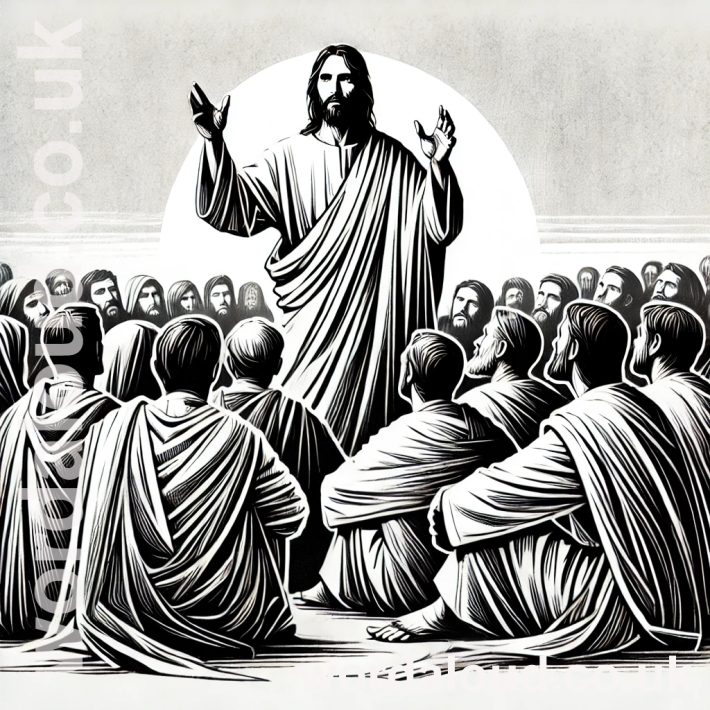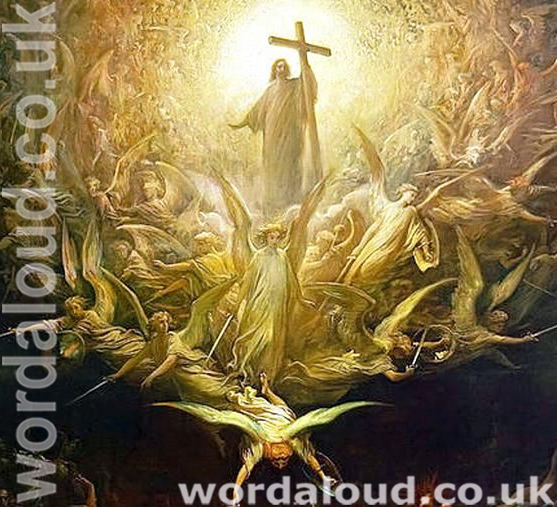Christian Art | The Ministry Of Love | Jesus Christ Saves
Office Of Readings | Week 18, Friday, Ordinary Time | A Reading From The Spiritual Canticle Of Saint John Of The Cross | I Will Espouse You To Myself For Ever
‘I give myself as your spouse for ever.’
This passage from The Spiritual Canticle brings the reader to the very heart of Saint John of the Cross’s mystical theology: the union of the soul with God, understood as a transformation in love and participation in the divine life.
John begins with a striking claim — that the soul, when united to God and transformed in him, ‘draws from within God a divine breath’. This is not a mere metaphor for inspiration. It expresses his conviction that the life of God flows directly into the soul in such union. The breath is not the soul’s own; it is God’s own life shared with the soul. This draws on Paul’s words in Galatians 4:6: ‘Because you are children, God has sent the Spirit of his Son into your hearts, crying, “Abba, Father.”’ For John, the presence of the Spirit is not simply moral guidance or consolation; it is the living bond of union with the Trinity.
The image works both ways. As God abides in the soul, God also ‘breathes forth the life of the soul as its exemplar’. In other words, the soul lives by imitating the divine pattern — God’s own knowing and loving — because it has been drawn into God’s inner life. This is the meaning of likeness: not equality with God in essence, which is impossible, but a true sharing in God’s operations through grace.
John is careful to distinguish the believer’s participation from Christ’s own divine nature. The Son is one with the Father by nature; the soul is one with God by participation. Yet this participation is real. As Jesus prayed in John 17, his desire is that those who belong to him ‘may be one, as we are one… that the love you have for me may be in them, and I in them’. The Father’s love for the Son becomes, by grace, the Father’s love for those who are in Christ.
This is what John calls ‘the transformation of love’. It is the deepest sense in which love is unitive: it draws the lover into the life of the beloved. Through such transformation, ‘souls possess the same goods by participation that the Son possesses by nature.’ This is the doctrine of divinisation (theosis), familiar in Eastern Christianity and present in Western mystical theology. It does not mean becoming God in essence, but becoming truly godlike through grace.
For John, this is not only a future promise. Even in the present life, the soul can share ‘in a real and perceptible way’ in the life of the Trinity, though not yet in its fullness. The life to come will bring total participation without limitation; but here and now, the believer can begin to live in that reality.
The reading turns from doctrine to spiritual exhortation. The soul is ‘created to enjoy such exquisite gifts’, yet John laments that so many remain blind and deaf to them. The reference to ‘the blindness of Adam’s children’ recalls humanity’s original calling and its loss through sin. The tragedy, in his view, is not simply that people sin, but that they ignore the astonishing dignity and destiny offered to them in Christ.
Thus the passage combines high mystical theology with urgent moral appeal. It insists that the soul’s union with God is not a remote abstraction but the central purpose of human life, grounded in Scripture, brought about by Christ, and already accessible in part through the life of grace.

A Reading From The Spiritual Canticle Of Saing John Of The Cross | I Will Espouse You To Myself For Ever
The soul united to God and transformed in him draws from within God a divine breath, much like the most high God himself. And God, abiding in the soul, breathes forth the life of the soul as its exemplar. This I take to be what Paul meant when he said: Because you are children of God, God has sent the Spirit of his Son into your hearts, crying, ‘Abba, Father’; this is what takes place in those who have achieved perfection.
One should not wonder that the soul is capable of so sublime an activity. For if God so favors her that she is made God-like by union with the most Holy Trinity, I ask you then, why it should seem so incredible that the soul, at one with the Trinity and in the greatest possible likeness to it, should share the understanding, knowledge and love which God achieves in himself.
How this is possible no other power or wisdom can express, save by explaining how the Son of God obtained this sublime state for us and won for us the power to be the children of God, as he asked of the Father: Father, I desire that where I am those you have given me may also be with me, that they may see the glory you have given me, that is, that they may share with certainty the very task I perform.
And then he said: ‘Not for them alone do I ask but also for those who will come to believe in me through their teaching, that all may be one as you, Father, are one in me and I in you, that they may be one in us; that the world may believe that you have sent me. And the glory you have given me I have given them that they may be one as we are. I in them, you in me, that they may be made perfect, and the world will know that you sent me and as you have loved me, so I have loved them.
The Father thus gives them the same love he shares with the Son, though not by nature as with the Son, but through unity and transformation of love. One should not think that the Son is asking the Father to make the saints one with him in essence and nature as the Son is with the Father, but rather that they be united with him in love, just as the Father and Son are one in the essential unity of love. Accordingly, souls possess the same goods by participation that the Son possesses by nature. As a result, they are truly divine by participation, equals and companions of God.
Thus Peter said: May grace and peace be perfected in you in the knowledge of God and Christ Jesus our Lord. For all things of his divine power, which are given to us for our life and goodness, are given through the knowledge of him who called us to his own glory and power, by which he has given us great and precious promises, that by these we may be made partakers of the divine nature. So the soul, in this union which God has ordained, joins in the work of the Trinity, not yet fully as in the life to come, but nonetheless even now in a real and perceptible way.
O my soul, created to enjoy such exquisite gifts, what are you doing, where is your life going? How wretched is the blindness of Adam’s children, if indeed we are blind to such a brilliant light and deaf to so insistent a voice.
Christian Prayer With Jesus Christ
Lord God,
You have called us to share in the love that unites the Father and the Son in the Holy Spirit.
Through the gift of your grace, draw our hearts into deeper union with you,
that we may live even now as partakers of your divine life.
Free us from the blindness that forgets your gifts
and open our eyes to the glory for which we were made.
Transform our love so that it reflects your own,
and let our lives bear the likeness of your Son,
until the day we see you face to face.
Through Christ our Lord. Amen.
Glossary Of Christian Terms
The Spiritual Canticle – A poem and commentary by Saint John of the Cross, using the imagery of a bride and bridegroom from the Song of Songs to describe the soul’s union with God.
Union with God – The deepest state of communion between the soul and God, made possible by grace, in which the soul shares in God’s life and love.
Divine Breath – In John’s imagery, the life of God flowing into the soul, recalling the biblical image of God breathing life into humanity (Genesis 2:7) and the sending of the Holy Spirit (John 20:22).
Participation – Sharing in God’s life and qualities, not by nature (as in the case of the Son) but by grace.
Divinisation (Theosis) – The process by which human beings, through grace, become ‘partakers of the divine nature’ (2 Peter 1:4).
Transformation of Love – The change brought about when the soul’s love mirrors God’s love, uniting the soul more fully to God.
By Nature / By Participation – A theological distinction: Christ is God by nature; believers become godlike by sharing in God’s life through grace.
Already–Not Yet – The belief that some aspects of God’s promises are experienced now, while their complete fulfilment awaits the life to come.
Adam’s Children – A biblical expression for humanity, highlighting its inheritance of sin and its need for redemption.








